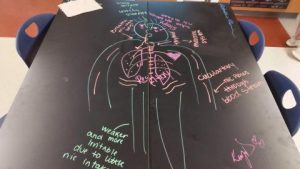Module: Vaping
EPIC Module for High School Biology Classes related to the Regulation of e-Cigarettes and Homeostasis
Major Themes for the Unit
- Scientific themes: Homeostasis, macromolecules, body systems
- Scientific practice: Modeling, claim evidence reasoning.
- SSI: Vaping/ e-cigarette usage has risen among teen. How should these products be regulated to protect public health?
Driving Questions:
- How should e-cigarettes be regulated?
- How do nicotine and e-cigarettes impact the human body?
Concepts needed to explore the driving question
- Science concepts: Homeostasis, macromolecules, body systems, hierarchy of life, cell membranes/ receptors, osmosis (optional), brain synapse (optional)
- What social ideas and concerns influence negotiation of the issue?
- age group of focus
- misconceptions about e-cigs
- peers possibly using e-cigs
- advertisements in public
- school and public bans on e-cig usage
- FDA’s new regulations
Unit-level performance expectations
NGSS:
- HS-LS1-3: Plan and conduct an investigation to provide evidence that feedback mechanisms maintain homeostasis
- HS-LS1-2: Develop and use a model to illustrate the hierarchical organization of interacting System that provides specific functions within multicellular Organisms.
- HS-LS1-6: Construct and revise an explanation based on evidence that organic macromolecules are primarily composed of six elements, where carbon, hydrogen, and oxygen atoms may combine with nitrogen, sulfur, and phosphorus to form large carbon-based molecules.
Unit Specific:
- Students use models as learning and reasoning tools.
- Students engage in socio-scientific reasoning to negotiate a SSI.
- Students will use scientific models to make and defend SSI arguments related to e-cig/ vaping regulations and potential impacts or certain regulations.
Unit assessment(s)
- The students’ modeling packets are used to assess student learning through their models and written responses in the unit.
- The unit test is used to assess students ability to comprehend and interpret scientific content along with the models.
- Culminating projects are used to assess students ability to form an argument based on scientific and ethical facts.
Designed and Developed by Amanda Peel, Jordan Rockett, Pat Friedrichsen, Laura Zangori, Clayton Elmy, Brandon Wagner, Rachel Tinsley, Alex Miller, Roxanne Hoover, Hai Nguyen, Andrew Kinslow, and Troy Sadler
Peel, A., Rockett, J., Friedrichsen, P., Zangori, L., Elmy, C., Wagner, B., Tinsley, R., Miller, A., Hoover, R., Nguyen, H., Kinslow, A. T., Sadler, T. D. (2018). Vaping: Regulation of e-Cigarettes and homeostasis. [Curriculum]. Columbia, MO: ReSTEM Institute at the University of Missouri. https://epiclearning.web.unc.edu/module-vaping/
Acknowledgments
The materials associated with the Vaping Module are based upon work supported by The Missouri Transect, a National Science Foundation EPSCoR Program, Cooperative Agreement IIA-1355406. Any opinions, findings, and conclusions or recommendations expressed in this material are those of the author(s) and do not necessarily reflect the views of the National Science Foundation.
